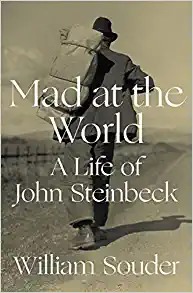
I cheated again. I listened to this biography of Steinbeck while doing my walking/work out/stretching (in that order!) at the local YMCA (thanks, Audible!). I’m a huge fan of Steinbeck, placing East of Eden in my top ten of favorite novels. And, as a novelist and writer myself, I always enjoy peeking under the tent to see how it’s done. Here goes.
Souder’s book is as literary as it gets. His writing style is immaculate, precise, concise, and well, just plain marvelous. The portrait he paints of the tortured life of one man, banging away at the keys, trying to write stories that others will enjoy, stories that will carry a message-for certain-but entertaining and well-received, is masterfully told. We journey with the author of Of Mice and Men, Travels with Charlie, Grapes of Wrath, The Red Pony, and countless other novels and short stories, from his humble California upbringing, to Stanford, to LA, to San Francisco, back to the Monterey area, to NYC, to Europe, and elsewhere all the while being a witness to the difficulties confronting those who write with an eye towards publication.
The personality quirks of Steinbeck, including his abhorrence at, yet pursuit of, fame; his seemingly manic-depression reeling from the pinnacle of happiness to the well of despair; are all chronicled here in bold and honest fashion. His loves, his friendships, his connections to other writers, his fear of rejection, his seeming lack of pride in his success (including his blasé reaction to being awarded a Pulitzer and a Nobel) are well described, detailed, and explored.
For me, a struggling author who has now lived a longer life than the greats I admire (Steinbeck, Hemingway, and Fitzgerald) how others deal with the pain of literary rejection and/or criticism is in my wheelhouse and Souder does a fine job of laying out the tortured path John Steinbeck trod in this regard.
My only criticism of the book is that, in the end, after Steinbeck’s passing is chronicled, the author doesn’t explore the man’s legacy, his current standing amongst other significant writers of the 20th century. I would’ve appreciated learning what, if anything, current academics and scholars and critics think of the man’s body of work. I have my opinion but I would have liked to have heard from other readers of the man’s classic works as to what his legacy is some fifty years after his passing.
4 and 1/2 stars out of 5. A biography all writers need to ingest and digest.
Peace
Mark


